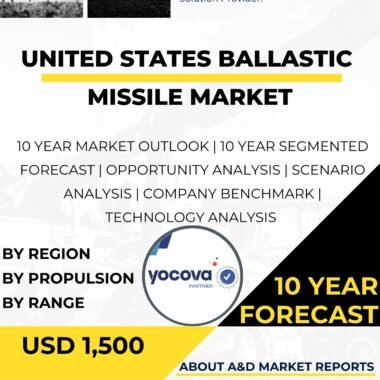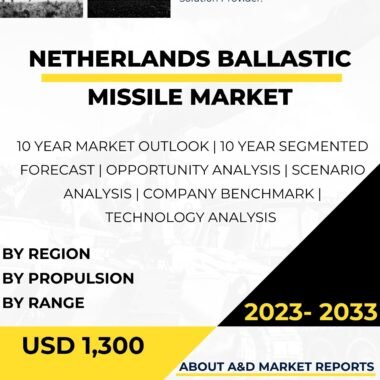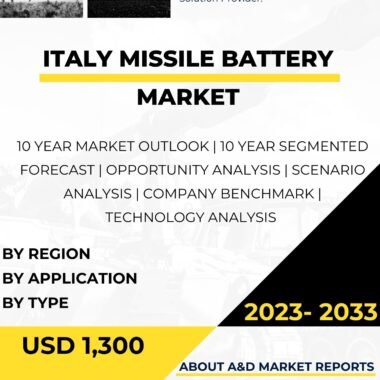Description
Germany missile battery market has been a significant and dynamic segment within the country’s defense industry. Missile batteries are essential components of a nation’s defense infrastructure, providing critical air defense capabilities to safeguard airspace, protect military assets, and deter potential threats. As one of the world’s leading economies and a key player in the global defense sector, Germany’s missile battery market has witnessed steady growth and technological advancements in recent years.
The Germany missile battery market encompasses a wide range of missile defense systems, including surface-to-air missile (SAM) systems, anti-ship missile batteries, and ground-based anti-ballistic missile systems. These missile batteries are deployed across different branches of the German Armed Forces, including the Army, Air Force, and Navy, to protect key military installations, critical infrastructure, and naval assets from airborne threats.
One of the primary drivers of the Germany missile battery market is the evolving security environment and the need to maintain a robust and capable air defense posture. As geopolitical tensions persist, the threat of airborne threats, such as enemy aircraft, drones, and cruise missiles, remains a top concern. Missile batteries serve as a crucial layer of defense, providing the capability to intercept and neutralize such threats before they can reach their intended targets.
Furthermore, Germany’s role as a key NATO member underscores the importance of advanced missile defense capabilities. As a member of the NATO integrated air defense network, Germany collaborates with other member states to provide regional air defense and contribute to the collective security of the alliance. This cooperation fosters the exchange of best practices, joint training exercises, and interoperability among allied missile defense systems.
The Germany missile battery market has also been influenced by technological advancements in missile defense systems. Modern missile batteries are equipped with sophisticated radars, command-and-control systems, and interceptors with improved accuracy and range. The integration of network-centric warfare concepts enables these systems to exchange real-time data with other military assets, enhancing overall situational awareness and response capabilities.
Moreover, the Germany missile battery market is driven by the need to adapt to emerging threats, such as hypersonic weapons and unmanned aerial systems (UAS). As adversaries continue to develop and deploy advanced and agile missile technologies, Germany must continuously invest in research and development to stay ahead of these threats and ensure its missile defense systems remain effective and reliable.
In recent years, there has been a growing emphasis on multi-layered missile defense strategies. Multi-layered defense involves the integration of different missile defense systems, such as short-range, medium-range, and long-range interceptors, to provide a comprehensive and flexible defense against a wide range of threats. This approach enables Germany to counter various airborne threats effectively and address potential gaps in its air defense coverage.
The export potential of German missile defense systems is another important aspect of the market. Germany’s reputation for producing high-quality defense equipment and its strong technological base make it an attractive supplier for other countries seeking advanced missile defense solutions. However, export decisions are subject to international regulations and political considerations, especially when it comes to sensitive military technologies.
Challenges faced by the Germany missile battery market include budget constraints and the need to balance investments in missile defense systems with other defense priorities. Missile defense systems can be costly to develop, procure, and maintain, and decision-makers must carefully prioritize investments to ensure the optimal allocation of resources across various defense requirements.
Additionally, the Germany missile battery market must address challenges related to missile proliferation and the development of advanced missile technologies by potential adversaries. As missile technology becomes more accessible and affordable, non-state actors and hostile states may pose increased threats with a diverse range of missile systems. Missile defense strategies must be adaptable and capable of countering these evolving threats effectively.
In conclusion, the Germany missile battery market is a significant and dynamic segment within the country’s defense industry. Advanced missile defense capabilities are essential for protecting airspace, safeguarding military assets, and contributing to regional and global security. The market is driven by the evolving security environment, technological advancements in missile defense systems, international cooperation within NATO, and the need to adapt to emerging threats. As Germany continues to invest in research and development and explores multi-layered defense strategies, the missile battery market is expected to play an increasingly pivotal role in enhancing the country’s air defense capabilities and contributing to international missile defense efforts.




